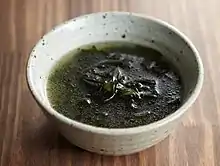Miyeok-guk
Miyeok-guk[1] (미역국) or seaweed soup[1] is a Korean soup whose main ingredient is miyeok, or seaweed.
 | |
| Alternative names | Seaweed soup |
|---|---|
| Type | Guk |
| Place of origin | Korea |
| Main ingredients | Brown seaweed or Wakame |
| Korean name | |
| Hangul | 미역국 |
|---|---|
| Revised Romanization | miyeok-guk |
| McCune–Reischauer | miyŏk-kuk |
| IPA | [mi.jʌk̚.k͈uk̚] |
Ingredients
Miyeok-guk ingredients typically include a mussel based broth, anchovy, beef, clams or oysters, soy sauce, sesame oil, garlic, onions, scallions, salt, roasted sesame seeds, and dried or pickled shrimps.
Preparation
To prepare miyeok-guk, dried miyeok is soaked in cold water until soft. It is then washed and boiled in an anchovy or mussel stock with shellfish or beef, and lastly seasoned with soy sauce, minced garlic and sesame oil.
Culture
Miyeok-guk is traditionally consumed by Korean women after giving birth. Miyeok is rich in calcium and iodine, nutrients that in the Korean culture are believed to be important for pregnant and/or nursing mothers.[2] Miyeok-guk is traditionally eaten for breakfast on birthdays, as a celebration of one's mother. As part of birthday celebrations, guests are served miyeok-guk along with rice cakes and other traditional foods. Miyeok-guk is also eaten outside of special occasions during the rest of the year. It is a very common side dish served with rice.
Health benefits
Seaweed is a good source of vitamin K, an essential vitamin, which is an important factor in blood-clotting. Eating miyeok-guk that contains a cup of seaweed enables one to absorb around 22% of the recommended daily vitamin K requirement for women and 29% of the recommended daily vitamin K requirement for men.
Popular belief
The word 'I ate seaweed soup' has two meanings. One is birthday, and the other means 'I failed the exam'. Although there is no scientific basis, it is said that slippery seaweed causes an association of 'slipping' and 'falling'.[3] Also, in a dictionary published by the Hangeul Society in 1957, "Eating Miyeok-guk(seaweed soup)" was defined as "a word that means an organization dissolves or falls apart." This is believed to have originated from the fact that when the Joseon army was disbanded, it could not express it directly and said, "I ate Miyeok-guk(seaweed soup)."[4]
See also
References
- (in Korean) "주요 한식명(200개) 로마자 표기 및 번역(영, 중, 일) 표준안" [Standardized Romanizations and Translations (English, Chinese, and Japanese) of (200) Major Korean Dishes] (PDF). National Institute of Korean Language. 2014-07-30. Retrieved 2017-02-16.
- 주요 한식명 로마자 표기 및 표준 번역 확정안 공지. National Institute of Korean Language (Press release) (in Korean). 2014-05-02.
- (in Korean) Miyeokguk at Doosan Encyclopedia
- "미역국". terms.naver.com (in Korean). Retrieved 2021-04-04.
{{cite web}}: CS1 maint: url-status (link) - 김, 준 광주전남연구원 책임연구원 (2021-04-23). "실패의 상징 `미역국 먹었다`, 구한말 군대 강제해산 자조적 표현에서 유래". 영남일보 (in Korean). Retrieved 2021-05-13.
{{cite web}}: CS1 maint: url-status (link)
External links
| Wikimedia Commons has media related to Miyeokguk. |
- (in English) Miyeok guk recipe from Maangchi.net
- (in Korean) Miyeok Guk recipe from Naver
- (in Korean) Miyeok guk recipe from Korean.net
- (in English) What Are the Health Benefits of Eating Seaweed?